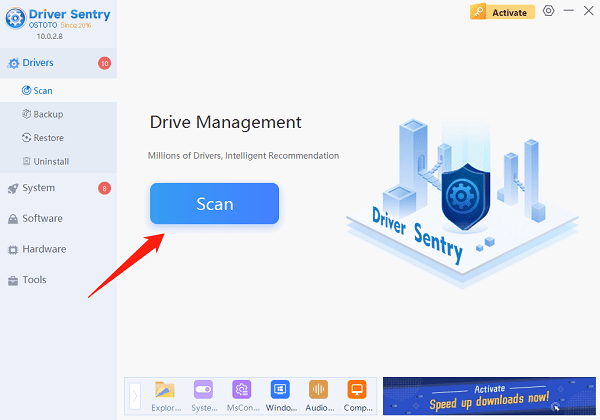
Battlefield 5, a popular multiplayer shooter, can crash on PC. This article offers a guide to troubleshoot and resolve these issues for a smoother experience.
1. Confirm System Requirements
Ensure your PC meets the minimum requirements for Battlefield 5:
OS: 64-bit Windows 10
Processor: AMD FX-8350 / Core i5 6600K
Memory: 8 GB RAM
Graphics: NVIDIA GeForce GTX 1050 / GTX 660 2GB or AMD Radeon RX 560 / HD 7850 2GB
DirectX: Version 11
Storage: 50 GB available space
2. Update Graphics Drivers
Outdated graphics drivers are a common cause of crashes in Battlefield 5. Updating your drivers can resolve compatibility issues. Use a tool like Driver Sentry for quick and error-free updates.
Download and install the latest version of Driver Sentry. Open the app and click "Scan".

Review the list of outdated drivers, locate your graphics driver, and click "Upgrade".
After the update, restart your PC to ensure the changes take effect.
3. Run the Game as Administrator
Locate the Battlefield 5 shortcut on your desktop and right-click it. Select "Properties".
Go to the Compatibility tab and check "Run this program as an administrator".

Click "Apply" and "OK".
Launch the game and check if the crash issue is resolved.
4. Verify Game File Integrity
Log in to your Steam account.
In your game library, right-click Battlefield 5 and select Properties.
Navigate to the "Local Files" tab and click "Verify Integrity of Game Files".

Wait for Steam to check and repair the files.
Once the process is complete, restart the game to see if the issue persists.
5. Adjust Virtual Memory Size
Press Win + S, search for "Control Panel", and open it.
Click System, then select "Advanced System Settings" at the bottom.
In the "System Properties" window, under the "Advanced" tab, click "Settings" in the Performance section.
In the "Performanc"e Options window, switch to the "Advanced" tab and click "Change" under Virtual Memory.
Uncheck Automatically manage paging file size for all drives.

Select the drive where the game is installed and check Custom size. Enter the following values:
Initial size: 1.5 times your physical RAM size.
Maximum size: 2-3 times your physical RAM size (in MB).
Click "Set", then "OK" to save changes. Restart your PC and try running the game again.
6. Disable In-Game Overlay
Open the Steam client.
Go to "Steam > Settings" from the top-left menu.
In the settings menu, select "In-Game".
Uncheck "Enable the Steam Overlay while in-game".

Click "OK" to save your settings.
7. Run a System File Check
Press Win + S, search for Command Prompt, and right-click to select "Run as administrator".
Enter the following command and press Enter: sfc /scannow
The system will scan and repair corrupted system files. This process may take several minutes.
Restart your PC after the scan and test the game.
8. Close Unnecessary Background Programs
Press Ctrl + Shift + Esc to open Task Manager.
In the Processes tab, check for programs using high CPU, memory, or disk resources.
Select unnecessary programs, right-click, and choose "End Task".
Common programs to close include browsers, download tools, and streaming software.
Switch to the Startup tab in Task Manager and disable unnecessary startup programs.
9. Reinstall the Game
Open Steam, right-click Battlefield 5, and select "Uninstall".
After uninstalling, navigate to the game's installation directory and delete any leftover files.
Check your "Documents" folder or "AppData" directory for game-related configuration files and clean them up.
Return to Steam, locate the game, and click "Install".
Choose a high-performance drive (e.g., SSD) for installation.
Once installed, ensure the game and drivers are up-to-date.
Follow these steps to identify and fix crashes in Battlefield 5 for optimal performance. If issues persist, contact EA support for help.
See also:
Steps to Update BIOS on a Computer
How to Fix Windows Msvcr120.dll Missing
How to Fix a Wireless Mouse Not Working
Guide to Fixing the "Print Spooler Service Not Running" Error